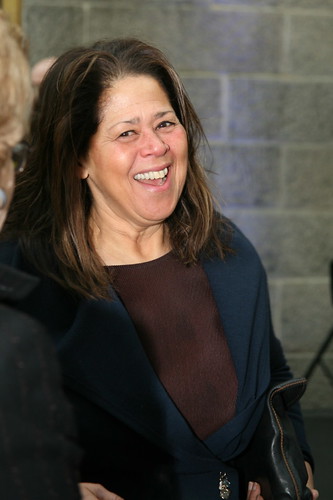Being the Second Charge,
Regarding the Bed of Procrustes
I had known about Anna Deavere Smith by the time I was a sophomore in college, but I never really sat down and read any of her plays until last year. I'd often heard the comparison between Smith's amazing work and what Tectonic Theater had done with The Laramie Project, but it took my growing interest in documentary theater and ethnography to finally make me pick up Twilight: Los Angeles, 1992.
What I found just about knocked me off my feet when I read it. I could remember the LA riots and the Rodney King trial back when it happened, but it wasn't something that really made an impact on a 12-year old celebrating her birthday in Montana. Now that that 12-year old is 30 and studying lit, however, Smith's recounting of the event is quite compelling. I read in Smith's play about everyone from disgraced cops to gang members to old Korean business owners layered together, and it was electrifying. The voices were messy, sometimes following completely different story lines, but they were woven together by Smith's solo performance and a common bewilderment about what went wrong. And, at the end, we have the voice of Twilight Bey, a gang member who spoke of hope in the confusion with such clarity that I marveled at him. When I get back home I want to read through Fires in the Mirror, although the one I'd really like to get my hands on sometime is Let Me Down Easy.
 What really fascinates me is the organic way in which these disparate voices seem to come together in Smith's work. Sure, Smith is a very creative editor, but she felt no need to jettison side narratives that didn't seem to really fit into the whole, like the story of the gang peace talks or the shooting of a young black girl by a Korean shop owner, both of which fill in the richly complicated background of community tension that existed long before Rodney King was beaten. I almost feel that she's willing to sacrifice continuity for texture. Some of these voices clash; some don't fit. And, many of the voices that couldn't fit in the original performance were re-added in the print version as part of her series On the Road
What really fascinates me is the organic way in which these disparate voices seem to come together in Smith's work. Sure, Smith is a very creative editor, but she felt no need to jettison side narratives that didn't seem to really fit into the whole, like the story of the gang peace talks or the shooting of a young black girl by a Korean shop owner, both of which fill in the richly complicated background of community tension that existed long before Rodney King was beaten. I almost feel that she's willing to sacrifice continuity for texture. Some of these voices clash; some don't fit. And, many of the voices that couldn't fit in the original performance were re-added in the print version as part of her series On the RoadNow, it could just be that familiarity breeds contempt, but I feel like that there's an unruliness, a slip to Anna Deavere Smith's work that fits the real world pace of painful revelation. That's an unruliness I don't feel with The Laramie Project, which feels more unyielding and tight like the suspension on a sports car. I sometimes wonder what had to be chopped off or didn't get noticed when Tectonic wound the plot of this play like a precision watch around the religious narrative.
Last time, we looked at that story line-- the religious factors contributing to Matt's murder-- which maybe, like Procrustes, Tectonic stretched out to make it fit on their theatrical bed. What I'd like to explore today are some of the other stories which maybe Procrustes chopped off to make this story run in that direction. I'm not sure which of these (if any) are really important, but let's see what possibilities we run into!

